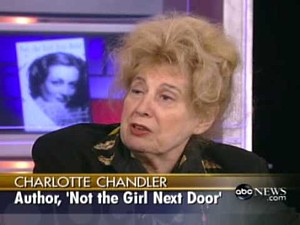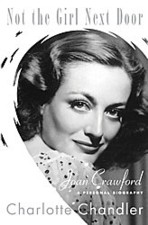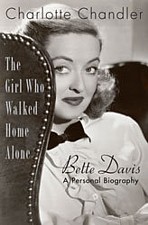
Chandler discussing her personal biography of Joan Crawford, "Not the Girl Next Door" on ABC News
and the cover of both her Crawford and Davis biographies
and the cover of both her Crawford and Davis biographies
film from a queer perspective
Interview
| KATM media outlets |
| KATM featured weekly |
| Join Us! |
| KATM on RT |
| Vidcast Starring KATM |
| NOTE: THIS SITE ONLY LOADS CORRECTLY WITH EXPLORER AND MOZILLA BROWSERS - SORRY SAFARI USERS! |
| Buy the KATM Book |
Charlotte Chandler on her Personal Biographies of Bette & Joan
Expanded Edition of 4-4-08 Windy City Times Interview
By Richard Knight, Jr.
Expanded Edition of 4-4-08 Windy City Times Interview
By Richard Knight, Jr.
| Forget six degrees of separation. To speak with author Charlotte Chandler is to be one degree away from true movie royalty. Get this: Chandler knew both Bette Davis AND Joan Crawford, included Ingrid Bergman, Groucho Marx, Alfred Hitchcock, Billy Wilder, and Federico Fellini among her intimates. She’s written what she terms “personal biographies” of all of them. Her latest is about Crawford, “Not the Girl Next Door” follows on the heels of her best selling Davis book, “The Girl Who Walked Home Alone.” Crawford, thanks to the double edged legacy of Mommie Dearest with its camp tagline “No wire hangers” has reached a new legion of younger fans while Davis continues to hold her own every time All About Eve shows up on Turner Classic Movies. Both stars are featured in new boxed DVD sets (Chandler is included in new documentary featurettes on many of these). And fans young and old unite around What Ever Happened to Baby Jane? the only screen teaming of these two classic stars who first defined the word “diva.” Chandler discussed Crawford and Davis and their enduring legacy (and enduring feud) in a wide ranging chat with Windy City Times. Excerpts: WINDY CITY TIMES (WCT): You knew both Bette and Joan. There are probably not many people in the world in your unique position. CHARLOTTE CHANDLER (CC): That’s true so it’s very special and I feel that it’s a responsibility to share it because they put a lot of time and effort into sharing with me and so I’m glad to be able to share it with other people. Because they are special. WCT: People don’t remember Norma Shearer anymore; they don’t remember Hedy Lamar or Rita Hayworth, why Joan and Bette? Because they were strong women? CC: Yes they were – the characters they played were. In fact, both of them said it was a problem for them to play such strong characters because audiences thought they were those people and if you do a good job you’re perceived as being that person. Especially Joan Crawford said it was a great problem for her but Bette, too. They said it was especially a problem with men; that men saw them as too strong. WCT: And were probably intimidated by them. CC: Yes, very much so and certainly for Bette Davis it limited the number of people, she felt, who dared to approach her. WCT: Was their feud real? Was it publicity? CC: I think that they didn’t care so much for each other. It wasn’t a feud, though. Joan Crawford said, “It takes two to feud” and she felt no feud at all. She said she never understood why she called Bette “Bette” and Bette called her “Miss Crawford.” But Bette told me that when she called her “Joan” it didn’t get a laugh, it didn’t any mention in a newspaper and if she called her “Miss Crawford” – especially with her sneer – she’d get a line in a column or something. WCT: They were both smart about publicity weren’t they? CC: They tried to be. No one ever cared so much about it, in my opinion, as Joan Crawford. She believed that her public had made her a star; not the studio but her public and she answered every piece of fan mail she ever got. When I first met her and then wrote her a few times she answered my short note with a long letter each time and I was very impressed. Then I found out she answered everybody that way and that was an amazing accomplishment. It was something she worked very hard on because she said that there were many people who only wanted the autograph but there were others to whom it meant a great deal and she couldn’t choose and she didn’t want to let anyone down. Bette Davis felt the same way but she wasn’t willing to answer all that fan mail. In their personalities, when you were with them, they were of a different style. Joan Crawford was very reserved and very polite and never wanted to hurt anyone’s feelings. Bette was much more like a stage actress and very dramatic. She didn’t exactly worry that much about everybody’s feelings if she got a good line in. But I think in many ways they were more alike than they were different. Each one of them was very involved with a father who wasn’t there. Both didn’t have fathers for most of their childhood but they reacted differently to that. For Joan, she said the most important man in her life, maybe the most important person in her life was her stepfather, daddy Cassin and he was a very positive influence because he gave her love and encouragement and he was a show business person and told her she was a wonderful dancer. He also helped her meet the dancers in his company and learn how to dance and he came at a crucial moment in her life. She loved him dearly and she took his name, “Billie Cassin,” and she wanted to be called Billie instead of Lucille which was the name she was born with. She really thought of him as her father, not the real father who had gone around the time she was born. Bette also said that her father was the most important person in her life because he was so negative a figure. Her mother seemed like the most important person because she was always trying to help Bette, be with her, and she devoted her life to her and to her sister. But the father paid no attention and Bette was always trying to win his respect and his love, too, if she could. She wanted to show him and she spent her life doing that. She was terribly sad when he died and she said to me later that she thought some of her sadness was because she couldn’t show him her success anymore. It led to a lot of testing of men where she would test them. WCT: She wrote and spoke a lot about this – testing her directors and her leading men. Especially her directors – boy if she found a weak director he was in trouble, Edmund Goulding on The Great Lie, right? CC: (laughs) Right! She tested them both professionally and personally to see if they would go if she kept going. Eventually they all did go. Both she and Joan were married four times as well. WCT: Now did one talk about the other? CC: Well, they had a lot of respect for each other and of course the film that maybe they’re both most famous for now with people is What Ever Happened to Baby Jane? and they’re in it together. They both talked a lot about working together on Baby Jane. Actually, Joan Crawford was very grateful to Bette Davis for turning down Mildred Pierce, the role that brought her back and won her the Oscar. It was so important to her. She’d left MGM because she wasn’t getting the parts she wanted and went to Warners where Bette was queen and Bette was offered Mildred Pierce first and hadn’t taken it. But Joan said that if she had taken it she wouldn’t have won the Oscar for it. Joan loved that part so much and one reason was because she felt that most people thought of Bette Davis as an actress and not just a star and that people thought she was a star and not so much of an actress and for her, her Oscar for Mildred Pierce proved that she really was an actress. WCT: I think she had already proved it already, certainly with A Woman’s Face. CC: I think she proved it quite a few times even going back to silent films where she had a great career even before sound films. WCT: Because you knew them both so well, was there anything that they did off the screen that would be surprising to people? CC: I think people would be surprised to realize how much Joan cared about what people thought of her and about always keeping up the image that she had. She told me that she heard her doorman telling another doorman that Joan Crawford lived in his building with a lot of pride and she said that she was never going to let down that doorman. She dressed up to take out her garbage (laughs). WCT: Was Joan funny? CC: Bette was funnier. Joan Crawford was a very serious person but she had a sense of humor. She appreciated humor and every once in awhile she had a pretty funny line. But Bette was constantly funny. WCT: I love the story about Joan having William Haines and his boyfriend over for dinner and they were standing in the backyard and it was chilly and they asked the butler to bring each of them one of Joan’s mink coats and she laughed and told the butler to get them (laughs). CC: (laughs) Right! WCT: Maybe you said this in one of the documentaries for one of those latter Warner Bros. pictures. She said she didn’t want to do some of those hard as nails characters but she gave the public what they wanted. She knew they wanted this tougher, Flamingo Road Joan and she wanted to do a softer, school teacher part. Did she ever talk about that with you? CC: Both Bette and Joan felt that when they strayed a lot from their character that the audience was often disappointed because they came with an expectation of a certain character. Yet both of them really wanted to do something different and show that they could do it. They would go against the studio sometimes but it was a big struggle for both of them to be able to do that. Joan Crawford with Louis B. Mayer at MGM to be able to be the bad woman in The Women and Bette Davis wanted to be in Of Human Bondage and be this person the audience would hate and of course the studios felt they should never be villainous or so bad that audiences could hate them – that it would carry over to other pictures and they would be ruined. Of course, as it turned out, they weren’t ruined. WCT: Interesting – because, of course – those are many of the roles that we remember so well and respond to decades later. CC: You mention William Haines and I was just watching him on Turner Classic Movies. He was such a great star and his name was so big over the title when Joan Crawford’s name was small and he helped her so much. I think besides daddy Cassin he was the person who helped her most because he helped her learn how to become a star. He was especially conscious of publicity and promotion. He had her hire a publicist when she couldn’t really afford it but then he gave the publicist most of the money so that could do it. WCT: I didn’t know that. Then she in turn, along with Carole Lombard, hired him to do their homes when he started the decorating business after he was forced to leave Metro because of being gay. CC: Yes – and both influenced and persuaded other friends to use him. WCT: I understand that Joan was one of his most loyal friends. CC: Yes – people who knew her were stunned by it. I knew Douglas Fairbanks, Jr. well, her first husband, and even before they got a divorce they were friends and remained so until Joan died. He thought she was the greatest person. In latter years she said that she regretted getting the divorce from him because he was a great person but she was extremely romantic and she believed that since they had this incredible, passionate relationship before they married and it was all fairytale and romance and everything was so wonderful that it had to go on like that every minute and if it didn’t something terrible was wrong. So when it wasn’t perfect she decided that it had gone wrong and they needed a divorce. WCT: Having known both, did you have a preference? CC: Well I knew Bette much longer than I knew Joan so I had a different relation with her. It’s very hard to say with all the people I’ve written about. They were all really wonderful people. Ingrid Bergman was an extraordinarily lovely person; I loved Billy Wilder – he was a great person. I loved Alfred Hitchcock and Groucho was my first book, “Hello, I Must Be Going.” Actually, that’s how I met Bette Davis. She called me and asked me if I would have lunch with her and it was because she’d read my book about him. She was a fan of Groucho’s. WCT: That was high praise, wasn’t it? CC: Yes – isn’t that wonderful? She didn’t tell me she wanted me to write a book; she just invited me to lunch and then during lunch she asked me about writing the book. That’s when she talked about something that Groucho did where he would try things out and if it got a laugh he’d leave it in and she said she did that in life. It was a bit like that with the feud between she and Joan. WCT: I remember when I talked with Virginia Madsen and she said, “I wish we had more of the protection of the studio system that Joan Crawford and Bette Davis had. You only saw these women on the screen or in very carefully controlled magazine pieces.” You didn’t see them going to the store. CC: The mystery, of course, is so important. Mystery is glamour and it would be a very great thing for someone to be able to achieve that under a microscope but I think that if the person really has that kind of ability as a performer and brings that much pleasure and happiness to people and makes that many movies. For me, one of the problems is that no one can make that many films now and everybody is limited because there aren’t that many films. When an actress could make as many as five films in a year it meant that if she had some failures they were hardly noticed because she was also having great successes. Most actresses can’t really predict which one is going to be the great part. Once in a while they get it right. Joan Crawford got it right with Mildred Pierce, certainly, they both got it right in Baby Jane. Bette Davis loved that movie and agreed to do it as long as she got to be Jane. She had the director Robert Aldrich tell her one thing: that he wasn’t having an affair with Joan Crawford because that meant that Joan would get more close-ups and that she would get to play Jane. Once that happened it was all okay. But if people only get to make one picture every two years – even big stars – they can’t be as much a part of people’s lives and there’s the question of whether coming into the home on television does the same thing. It makes people very famous and part of people’s lives but not in the same way. They’re not larger than life blown up there on the screen. Certainly actresses like Bette Davis and Joan Crawford thought about over exposure and they were careful and they were always worried about doing too much outside of their movies like radio, at first, or television later. They wouldn’t do too many articles, too many interviews – anything that would overwhelm the audience. They always tried to maintain a bit of a distance. WCT: They learned from Garbo. CC: (laughs) Yes. Garbo learned from Garbo. WCT: So are you working on another book? CC: I am. The next book is going to be about Mae West. WCT: Fabulous. Talk about somebody who built an archetype on the screen that was different than the person off the screen. CC: That’s exactly what I’m writing about. I’m writing about the difference between the Mae West I knew in real life and the one on the screen. Sometimes she was Mae West in real life and sometimes she was partly or wholly the character on screen and the separation and whether she could easily separate them herself – she couldn’t all the time. WCT: I would guess that to be true – especially when she got further away from what made her so famous and what people probably from her. CC: Well she hung on to it quite long. I met her in the last year of her life and she was at least 87 and she was Mae West still. But I could say the same thing about all the great stars I knew. When I met Bette Davis and I went in to see her in the hotel apartment in New York she was dressed as Bette Davis in a fantastic black dress and sheer black stockings and black pumps and made up with eye shadow and eye lashes – false eyelashes were a big thing for both Joan and Bette – to emphasize the big eyes and she looked like Bette Davis in a Warner Bros. movie. Then when I went to meet Joan Crawford the first time she had done the same thing. They didn’t keep it up forever but they both thought the first impression was the most important. |



NOTE: This is an expanded interview with Chandler conducted for a piece about the enduring
popularity of Crawford and Davis for separate pieces in both the Chicago Tribune and Windy City
Times. I've never posted this to the KATM site but in conjunction with my hosting the third annual
screening of Mother's Day with Mommie Dearest, here's the entire interview. Enjoy!
popularity of Crawford and Davis for separate pieces in both the Chicago Tribune and Windy City
Times. I've never posted this to the KATM site but in conjunction with my hosting the third annual
screening of Mother's Day with Mommie Dearest, here's the entire interview. Enjoy!



